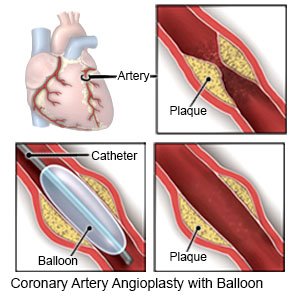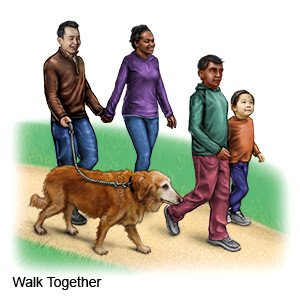Peripheral Artery Disease
Medically reviewed by Drugs.com. Last updated on Apr 2, 2024.
AMBULATORY CARE:
Peripheral artery disease (PAD)
is narrow, weak, or blocked arteries. It may affect any arteries outside of your heart and brain. PAD is usually the result of a buildup of fat and cholesterol, also called plaque, along your artery walls. Inflammation, a blood clot, or abnormal cell growth could also block your arteries. PAD prevents normal blood flow to your legs and arms. You are at risk of an amputation if poor blood flow keeps wounds from healing or causes gangrene (tissue death). Without treatment, PAD can also cause a heart attack or stroke.
Common symptoms include:
Mild PAD usually does not cause symptoms. As the disease worsens over time, you may have the following:
- Pain or cramps in your leg or hip while you walk
- A numb, weak, or heavy feeling in your legs
- Dry, scaly, red, or pale skin on your legs
- Thick or brittle nails, or hair loss on your arms and legs
- Foot sores that will not heal
- Burning or aching in your feet and toes while resting (this may be worse when you lie down)
Call your local emergency number (911 in the US) if:
- You have any of the following signs of a heart attack:
- Squeezing, pressure, or pain in your chest
- You may also have any of the following:
- Discomfort or pain in your back, neck, jaw, stomach, or arm
- Shortness of breath
- Nausea or vomiting
- Lightheadedness or a sudden cold sweat
- You have any of the following signs of a stroke:
- Numbness or drooping on one side of your face
- Weakness in an arm or leg
- Confusion or difficulty speaking
- Dizziness, a severe headache, or vision loss
Seek care immediately if:
- You have sores or wounds that will not heal.
- You notice black or discolored skin on your arm or leg.
- Your skin is cool to the touch.
Call your doctor if:
- You have leg pain when you walk 1/8 mile (200 meters) or less, even with treatment.
- Your legs are red, dry, or pale, even with treatment.
- You have questions or concerns about your condition or care.
Treatment for PAD
can help reduce your risk of a heart attack, stroke, or amputation. You may need more than one of the following:
- Medicines may be given to prevent blood clots and reduce the risk of a heart attack or stroke. You may be given medicine to help prevent your PAD from getting worse.
- A supervised exercise program helps you stay active in normal daily activities. Healthcare providers will help you safely walk or do strength training exercises 3 times a week for 30 to 60 minutes. You will do this for several months, then transition to walking on your own.
- Angioplasty is a procedure to open your artery so blood can flow through normally. A thin tube called a catheter is used to insert a small balloon into your artery. The balloon is inflated to open your blocked artery, and then removed. A tube called a stent may be placed in your artery to hold it open.

- Bypass surgery is used to make a new connection to your artery with a vein from another part of your body, or an artificial graft. The vein or graft is attached to your artery above and below your blockage. This allows blood to flow around the blocked portion of your artery.
Treatment options
The following list of medications are related to or used in the treatment of this condition.
Manage and prevent PAD:
- Walk for 30 to 60 minutes at least 4 times a week. Your healthcare provider may also refer you to a supervised exercise program. The program helps increase how far you can walk without pain. It also helps you stay active in normal daily activities

- Do not smoke. Nicotine and other chemicals in cigarettes and cigars can worsen PAD. They can also increase your risk for a heart attack or stroke. Ask your healthcare provider for information if you currently smoke and need help to quit. E-cigarettes or smokeless tobacco still contain nicotine. Talk to your healthcare provider before you use these products.
- Manage other health conditions. Take your medicines as directed and follow your healthcare provider's instructions if you have high blood pressure or high cholesterol. Perform foot care and check your blood sugar levels as directed if you have diabetes.
- Eat heart-healthy foods. Eat whole grains, fruits, and vegetables every day. Limit salt and high-fat foods. Ask your healthcare provider for more information on a heart healthy diet. Ask what a healthy weight is for you. Your healthcare provider can help you create a healthy weight-loss plan, if needed.

Follow up with your doctor as directed:
Write down your questions so you remember to ask them during your visits.
© Copyright Merative 2024 Information is for End User's use only and may not be sold, redistributed or otherwise used for commercial purposes.
The above information is an educational aid only. It is not intended as medical advice for individual conditions or treatments. Talk to your doctor, nurse or pharmacist before following any medical regimen to see if it is safe and effective for you.
Learn more about Peripheral Artery Disease
Treatment options
- Medications for Aortic Aneurysm
- Medications for Bleeding Disorder
- Medications for Cardiovascular Conditions and Disorders
- Medications for Peripheral Arterial Disease
- Medications for Renal Artery Atherosclerosis
- Medications for Thrombotic/Thromboembolic Disorder
- Medications for Vasculitis
Care guides
Symptoms and treatments
Medicine.com guides (external)
Further information
Always consult your healthcare provider to ensure the information displayed on this page applies to your personal circumstances.
